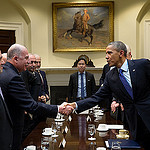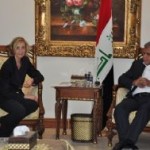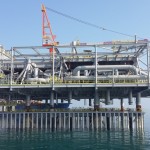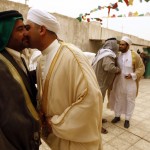Iraq Security News: Iraqi forces target al-Qaeda hideouts in Anbar desert
 The Iraqi Ministry of Defence this week launched a large scale military operation targeting al-Qaeda hideouts in the Anbar desert.
The Iraqi Ministry of Defence this week launched a large scale military operation targeting al-Qaeda hideouts in the Anbar desert.
The crackdown comes in response to recent attacks on Iraqi security forces in the area, including a deadly Saturday (December 21st) search of an al-Qaeda camp near al-Rutbah in which 17 Iraqi soldiers were killed, among them six senior officers, officials said.
“It is also linked to al-Qaeda members’ attack on mud structures inside the Anbar desert in the course of an attempt by the army to search them, which led to the death of the Army’s 7th division commander, Maj. Gen. Mohammed al-Kurwi, and his deputy, Brig. Gen. Noman al-Zawbaie, along with four officers and 11 soldiers, Lt. Col. Najm al-Dulaimi, spokesman for the Iraqi army in Anbar said.
The operation, which began Sunday, is part of the Iraqi army’s plans to wipe out al-Qaeda pockets in the desert, al-Dulaimi said.
It is being carried out by army forces with planes, tanks, mobile artillery and units from the 7th and 1st Divisions, border guard forces and golden division commandos, who are part of the rapid intervention forces, said Iraqi army land forces commander Lt. Gen. Ali Ghaidan.
“Army forces are seeking to cleanse the Horan and the White Valleys area of the gunmen who exploited bad weather to return and establish bases there which they used to launch terrorist attacks on various cities, not only in Anbar, but across the country,” Ghaidan told Mawtani.
The operation has been given one week to remove al-Qaeda operatives from the area, said Lt. Gen. Abdul Aziz al-Obaidi, commander of army operations in Anbar province.
The army is making significant progress to this end, he said, adding that the Iraqi forces ran into pockets of ineffective al-Qaeda resistance on the first day of the operation.
“In the course of the clashes, 11 gunmen were killed, and 49 others were captured,” as of Thursday (December 26th), he said. Among the dead are two al-Qaeda leaders, one of them a Syrian national known as Abu Ahmed al-Souri.
The security forces also seized large caches of explosives, various weapons and rockets, 4 billion Iraqi dinars ($3.4 million) and satellite communication devices, he added.
The army is continuing its march towards the more threatening desert areas such as the Horan and the White Valley, al-Obaidi said, with aerial support and backing from tanks and mobile artillery.
This desert operation differs from others carried out by the army this year as a larger number of soldiers are participating, he said. Its objective is to strip al-Qaeda of its last asset, the desert, where it retreats to seek refuge and regroup whenever the security forces step up the pressure in the cities.
Al-Qaeda is trying to control the desert in order to serve its Iraqi and Syrian branches, Anbar provincial council chairman Sabah Karhout told Mawtani.
“But this military operation will put an end to this plan”, he said.
TRIBESMEN ARE SUPPORTING THE OPERATION
The tribal council of western Anbar has declared its support for the operation.
“The operations have won the tribesmen’s support and backing, and everyone agrees they are needed,” said tribal council secretary general Sheikh Ghassan Abdullah al-Kilani.
“Political disputes and other problems aside, the security issue prevails over any other, because as Iraqis we are all in the same boat and our destiny is the same,” he told Mawtani.
“We give our blessings to the Iraqi army operation in the Anbar desert to pursue terrorist groups and we hope it will achieve its objectives,” al-Kilani said.
Sheikh Hameed al-Hayes, military commander of the Iraqi Sahwa forces and head of the Anbar Salvation Council, said dozens of tribesmen and Sahwa members have joined the army in the Anbar desert to provide back up and intelligence.
The majority of the tribesmen have rallied in a voluntary, spontaneous manner to help the army suppress the armed groups, al-Hayes told Mawtani.
The Saturday incident in which the soldiers were killed was “a major motive for the tribesmen that led to the eruption of patriotic spirit to defend Iraqi soil against those who mean harm to the country”, he said.
Source: Mawtani












